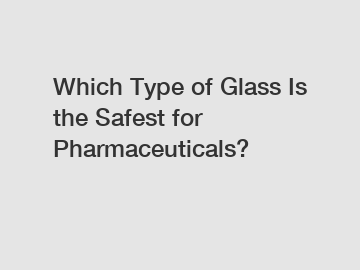Feb. 02, 2024
Packaging & Printing
Which Type of Glass Is the Safest for Pharmaceuticals?
Keeping pharmaceuticals safe and free from contamination is crucial for ensuring the well-being and health of patients. One key aspect of pharmaceutical safety is the choice of glass used for packaging. But with so many options available, it can be challenging to determine which type of glass is the safest for pharmaceuticals. In this article, we will explore various types of glass commonly used in pharmaceutical packaging and delve into their safety aspects.
1. Borosilicate glass: Borosilicate glass is widely recognized for its excellent chemical resistance and durability. It is composed of boron trioxide and silica, making it resistant to thermal shock and able to withstand high temperatures. Borosilicate glass also has a low coefficient of thermal expansion, which ensures it remains stable even when exposed to rapid temperature changes. These properties make it a popular choice for pharmaceutical packaging, particularly for parenteral solutions and certain solid dosage forms.

2. Soda-lime glass: Soda-lime glass is a commonly used glass type due to its affordability and accessibility. It is made from a mixture of silica, soda ash, and lime, making it less expensive compared to borosilicate glass. However, soda-lime glass is more susceptible to thermal shock and has a higher coefficient of thermal expansion, which may lead to breakage under certain conditions. Therefore, it is less commonly used for pharmaceutical packaging, especially for sensitive formulations.
3. Type I glass: Type I glass, often referred to as "neutral glass," is a borosilicate glass with the highest hydrolytic resistance. It is highly inert and resists leaching of alkali metals and boron, making it suitable for sensitive drug formulations. The exceptional chemical resistance of Type I glass minimizes the risk of drug-container interactions, ensuring the stability and integrity of pharmaceutical products over time. Hence, it is the preferred choice for many parenteral medications and injectable drugs.
4. Type II glass: Type II glass, also known as "treated soda-lime glass," is a modified version of soda-lime glass that undergoes surface treatment to enhance its chemical resistance. The treatment involves alkali ion exchange or coating the inner surface with a protective layer. While Type II glass exhibits improved chemical durability compared to regular soda-lime glass, it still falls short of the superior performance offered by borosilicate glass or Type I glass. It is commonly used for oral medication packaging and some non-sterile liquid formulations.
5. Type III glass: Type III glass, or "regular soda-lime glass," is the most economical option among the three types. It offers limited resistance to chemical attack and is most suitable for packaging dry powder medications, tablets, and capsules. While it may not be the safest option for highly sensitive drugs, Type III glass remains a viable choice for products that are not susceptible to container-glass interactions.
Conclusion:
In conclusion, the choice of glass for pharmaceutical packaging depends on the specific medication and its susceptibility to container-glass interactions. Borosilicate glass, with its exceptional chemical resistance, stability, and durability, is often considered the safest option for sensitive pharmaceutical formulations. Type I glass, a specific type of borosilicate glass, provides the highest level of hydrolytic resistance and is commonly used for parenteral drugs. Type II glass offers improved chemical resistance compared to regular soda-lime glass, while Type III glass remains economical and suitable for less sensitive drug formulations. Careful consideration of the properties and compatibility with drug products is essential to ensure the safety and efficacy of pharmaceuticals.
For more information, please visit borosilicate 5.0 glass tube, oral liquid vials manufacturer, borosilicate glass tube suppliers.
If you are interested in sending in a Guest Blogger Submission,welcome to write for us!
All Comments ( 0 )